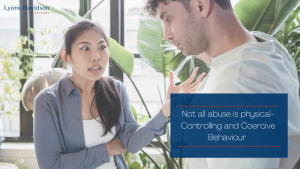
How often do you hear from your friends or family members “But he doesn’t hit me, so it’s not really abuse”, “I feel embarrassed; she doesn’t hit me, I just feel trapped and controlled” or “I don’t have any marks or bruises; who is going to believe or even support me”.
The truth is that abuse is not just physical. Abuse takes many forms and English law offers protection to those who suffer from physical abuse, emotional abuse, coercive or controlling behaviours, economic abuse and various other forms.
Last year, in Avon and Somerset alone, there were 22,000 callouts for domestic abuse which is a staggeringly high number.
It was in 2015 that controlling and coercive behaviour was recognised in English Law. Sadly, I am sure we all know of friends or family members who have become isolated and an individual has taken control over aspects of their everyday life, such as where they can go, who they can see, what they can wear, what they can buy and when they can sleep. They become a shadow of their former self.
No one should suffer in silence. The world has woken up to this spectrum of insidious behaviour.
The impact of controlling and coercive behaviour was front and centre in the case of Sally Challen. You may have seen this story in the news a few years ago.
It was 2010 and Sally had just served lunch to her husband. Shortly after, she picked up a hammer and bludgeoned him in the head until he died. At court, Sally was cast simply as a jealous wife seeking revenge and she was convicted of murder in 2011.
While Sally was in prison, the world outside was becoming aware of controlling and coercive behaviour and its place in law was established in 2015. Meanwhile, inside the prison, Sally undertook a domestic abuse workshop called Freedom.
This was the moment of realisation for Sally. The Freedom course had given a name to the behaviour she had suffered from for decades – controlling and coercive behaviour. This was what she was unable to articulate in court; this was the cause of her broken self.
Fast forward to 2019 and new psychological evidence came to light which showed Sally had a dependent personality disorder and bipolar as a result of the decades of controlling and coercive behaviour she suffered at the hands of her husband. The matter was brought back before the court and her conviction was overturned from murder to manslaughter. This came with a lesser sentence; one she had already served in prison. It was on this day that Sally Challen walked free.
If you or someone you know is suffering from any form of abuse, there is support available namely:-
- For initial support and guidance, contact organisations such as NextLink (nextlinkhousing.co.uk / 0800 4700 280) and Refuge (refugetechsafety.org / 24 hour hotline: 0808 2000 247) . They can help identify what support is available to yourself or your loved one and what appropriate steps to take. NextLink also offers the Freedom Course, the same course that awakened Sally Challen.
At Lyons Davidson, we are experts in the field of domestic abuse and we can assist you in getting a court order to protect you. If the following orders are breached, the perpetrator can be arrested and potentially serve a prison sentence.
- Non-Molestation Order: This ensures that the perpetrator does not make contact and stays away from the victim.
- Occupation Order: This can require a perpetrator who is living in the same property to leave and not make contact with the victim.
If you require any further information about this issue, please do not hesitate to contact our experts, Maxwell Gunning at [email protected] or Carol Chrisfield at [email protected].



